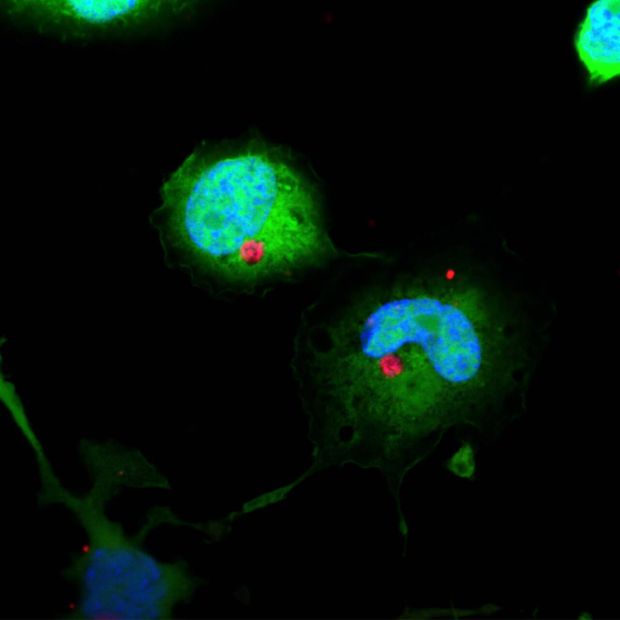Your selection
Research / 19.05.2020
Cells sound the alarm on chlamydia

A chlamydia infection triggers an inflammatory response at the cellular level. MDC researchers conducted experiments in cell cultures to examine the role that the enzyme GBP1 plays in this response. They have now published their findings in Cell Reports.
Chlamydia is one of the most common sexually transmitted diseases in Germany. Chlamydia bacteria need host cells to survive and reproduce. They often use mucous membrane cells in the human reproductive and urinary organs for this purpose, effectively “hijacking” the host’s cellular metabolism. These intruders either go undetected or signaling molecules alert the innate immune system of their presence. In the latter case, the body’s own defense system recognizes the bacteria as foreign and provokes an inflammatory response to destroy the bacteria.
The human guanylate-binding protein 1 (GBP1) plays a key role in the defense mechanisms against chlamydia or other pathogens. Researchers already know that this enzyme is not only capable of slowing down the reproduction of the chlamydia bacteria, but can also set off an inflammatory response by turning on certain signaling pathways. Yet exactly how these processes work is still a mystery. Now, a team led by Professor Oliver Daumke at the Max Delbrück Center for Molecular Medicine in the Helmholtz Association (MDC) has learned more about the role of specific metabolites of the enzyme in question. Working with the Max Planck Institute for Infection Biology, the researchers discovered which signaling pathways and protein complexes are activated by the metabolites.
GMP is important for the immune defense
The enzyme being studied – GBP1 – can act as a catalyst to speed up the cleavage of bioactive compounds. “It converts GTP to GMP in two steps through a reaction with water,” Daumke says. “GTP is a widely distributed cellular molecule that serves as a building block of RNA and is required for signaling processes.”
To understand what effect this cleavage has on the cell, Audrey Xavier, a PhD student in Daumke’s lab and the lead author of the study, modified the catalyzing enzyme. The enzyme either no longer functioned or it could only carry out the first step of the cleavage. She then introduced the different variants of the enzyme into human immune cells and infected them with chlamydia. The researcher was only able to measure typical inflammatory responses in those cells where the cleavage was fully possible. “That shows that GMP is crucial for this process,” Xavier says. But GMP does not appear to be responsible for slowing the growth of chlamydia. “Unfortunately, we still don’t exactly know how GBP1 inhibits the growth of the bacteria,” she says.
Blocking the signaling pathway
Xavier was even able to determine which signaling pathway GMP turns on in infected cells. According to the researcher, there are various protein complexes that can provoke an inflammatory response in cells, and the most well-known of these – the NLRP3 inflammasome – is activated when GMP is broken down to uric acid.
She managed to shut down this uric acid signaling pathway with an already approved drug that is normally used to treat gout. This disease is characterized by especially severe inflammatory responses. The research team observed that the agent allopurinol attenuates the inflammatory symptoms in cells infected with chlamydia. “Allopurinol helps reduce inflammation – and possibly also in people who have chlamydia,” Xavier says, adding: “But first clinical trials will need to test whether this might have potential as a supplemental therapy in combination with an antibiotic.”
Source: https://www.mdc-berlin.de/news/news/chlamydia-cells-enzyme-GBP1-allopurinol
Overview News
News Buch Berlin
From cell biology to CRISPR/Cas – new knowledge for schools
The Life Science Learning Lab at the Berlin-Buch research campus offers both school students and teachers the opportunity to immerse themselves in science. This year, the facility celebrates its 25th ...
more ...ERC grants Berlin scientists € 2.5 million each
Neuroscientists Gary Lewin and James Poulet at the Max Delbrück Center for Molecular Medicine have won highly coveted and competitive ERC Advanced Grants to study pain and the neural mechanisms that u...
more ...The Protein Expert
Prof. Dr. Fan Liu from the Leibniz-Forschungsinstitut für Molekulare Pharmakologie (FMP) has recently received several awards for her contributions to the field of cross-linking mass spectrometry.
more ...Events Buch Berlin
06.05.2024, 09:00
Realtime PCR und digital PCR Kurs
Der RealTime PCR und Digital PCR Kurs richtet sich an erfahrene PCR Anwender*innen und an Einsteiger*innen. Wichtige PCR Grundlagen werden erörtert, bevor die RealTime PCR besprochen und Genexpression...
more ...22.06.2024, 16:00
Lange Nacht der Wissenschaften 2024
Save the date!
more ...







